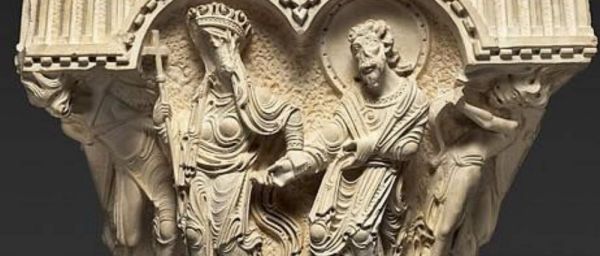Also in domestic style
Jn 6:44-51 (41-51)
Jesus wants to turn the page. He does not intend to prop up the muddled, no longer vital.
He is faithful to the law of change of full Life, which ceaselessly seeks new arrangements - instead of stagnating in the situation.
This (at all times) while the religious authorities and the habitués wish to cling to the past, to what they know, to the ordinary sense of 'justice', to the morality of reference around...
In short, when it is Christ's time, everyone leaves. But the disagreement is already written.
God does not draw with peremptory force or blackmail, but with invitation (v.44).
And sincere belief is activated by an initial testimony in oneself (v.44).
For his social status as a small artisan [a landless man], the 'murmuring' (vv.41.43) was obvious, and referred back to the same opposition expressed by God's people wandering in the wilderness.
Not only is the divine claim to be authentic Manna, but the very origin of Jesus is incomprehensible to a devoutly quiet, normalised mentality - one that allows itself to be carried away without enigma.
The contestation is unrestrained and radical; it prefers and follows what gives immediate security - not the original. But the Lord does not slacken, otherwise he would leave us to become chronic.
Having to seem, having to be, having to do, do not give room for listening, for perception, for the change that awaits us: they paralyse.
The Father acts within each one to reshape convictions, adhesions, projects.
Everything works in the direction of ourselves, not unnaturally or of others - not even of Him.
He acts present in each person in the most spontaneous way.
In this way and at the same time, akin to individuating principles; more respectful of inclinations, of real characteristics, of energies even of the period.
This teaching (v.45) is interior: impersonated by Christ in the Word that does not distort anything - implicit in his Person and vicissitude.
Thus the gift of life is linked to assimilating and becoming One with that Food. Food that does not undermine the person, but rather convinces, sustains, ferments, and directs - in an unrepeatable way, by Name.
That sugared Bread grasps the flavour of an exterior emptiness at the bottom of which there is no annihilation: we are introduced into redemption, immersed in new life.
In conformity, life does not kill extinction. It does not possess the virtue of tying up the threads that distinguish the character of Person, nor the innate quality, the vocational essence, the propulsive capacity [Life of the Eternal].
It is the implicit 'cultural', ritual and banal, uninspired, ungenuine, that does not become living - and does not guarantee fullness but rather habituation.
As for us, if we have made a callus to it.
The bread of the earth preserves life but does not update, does not regenerate us ceaselessly, nor does it open a way through death.
The Bread that re-actualises for us the ultimate gift of the Son, nourishes existence with an indestructible quality that does not fade away, because Divine Gold of our being springs forth.
The prophets had announced: in the last times one would not know God by hearsay but by personal experience.
After the failure of kings and the priestly class, men would be taught directly by the Lord.
The expression 'Bread come down from Heaven' designates Jesus himself in relationship with the Father and [precisely] in his mission to bring Wisdom and exuberant Life to men.
Divine life, without limits, pours out immediately, to each one. Without uncertainties or interpretations veiled by the shortcomings of the "mediators", which on the contrary would lead to collapse.
Presence that in the time of complexity also kindles in us the desire to be taught by God-in-Person, guided by the inner Friend. They would be filled with regenerating insights, in his Spirit.
He inclines us to pay no heed to a nature that seeks and "murmurs" only for the corrupt "taste" of sustenance: "manna in the wilderness" (v.49); that is, interest, reputation, titles, trivialities of satisfaction.
Rather, we find authentic Life in the gift of good intuition and inner Vision.
In the grace that enables us to welcome the Call.
In the virtue that remains in listening - through active fidelity to the Vocation, through self-denial and righteousness of intentions that appropriate the virtues and merits of Christ.
"I am the Bread the Living, the one who came down from heaven. If anyone eats from this Bread he will live the Life of the Eternal, and the bread that I shall give is my flesh for the fullness of life in the world" (v.51).
The Spirit that internalises and actualises is the main Subject of even the most summary, daily history of salvation. Making ourselves our own.
By evangelising us and growing in Friendship ["instructed by God" (v.45)] the nourishing action of the Master immerses our fermented flesh in the New Life.
The Son beside us changes our 'taste' and familiarises of Himself the same 'Nature'.In this way, we too, assimilated and identified with the Bread-Person made intimate, reveal totality in action, living eternity, the original Source.
To internalise and live the message:
How do you enter into the gift of redemption through the Eucharist?
What 'contrary' morals around, the Bread of Life seeks to impart to you?
Have you ever felt 'severed from the earth' because of your different nourishment from Heaven?
What were the opportunities to make the leap that you may have overlooked?


